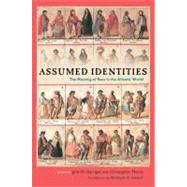Assumed Identities : The Meanings of Race in the Atlantic World
, by Garrigus, John D.- ISBN: 9781603441926 | 1603441921
- Cover: Hardcover
- Copyright: 7/12/2010
With the recent election of the nationrs"s first African American president-an individual of blended Kenyan and American heritage who spent his formative years in Hawaii and Indonesia-the topic of transnational identity is reaching the forefront of the national consciousness in an unprecedented way. As our society becomes increasingly diverse and intermingled, it is increasingly imperative to understand how race and heritage impact our perceptions of and interactions with each other.Assumed Identitiesconstitutes an important step in this direction. However, "identity is a slippery concept," say the editors of this instructive volume. This is nowhere more true than in the melting pot of the early trans-Atlantic cultures formed in the colonial New World during the seventeenth, eighteenth, and nineteenth centuries. As the studies in this volume show, during this period in the trans-Atlantic world individuals and groups fashioned their identities but also had identities ascribed to them by surrounding societies. The historians who have contributed to this volume investigate these processes of multiple identity formation, as well as contemporary understandings of them. Originating in the 2007 Walter Prescott Webb Memorial Lectures presented at the University of Texas at Arlington,Assumed Identities: The Meanings of Race in the Atlantic Worldexamines, among other topics, perceptions of racial identity in the Chesapeake community, in Brazil, and in Saint-Domingue (colonial-era Haiti). As the contributors demonstrate, the cultures in which these studies are sited helped define the subjectsrs" self-perceptions and the ways others related to them.







